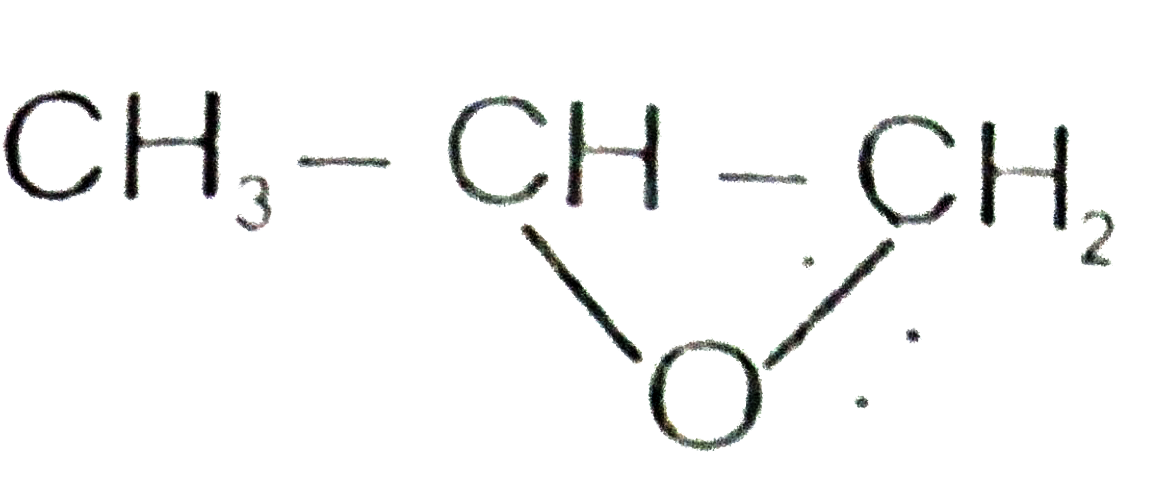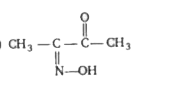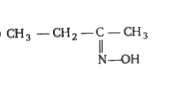CH3CH=CH2H/H2O−−−−→ major product is

CH3OH∣CHCH3
CH3CH2CH2OH
CH3CH∣OH−CH2∣OH
The correct Answer is:B
To solve the question regarding the reaction of propene (CH₃CH=CH₂) with water (H₂O) in the presence of an acid (H⁺), we will follow these steps:
Step 1: Identify the Reactants
The reactant is propene, which is an alkene with the molecular formula CH₃CH=CH₂. It will react with water in the presence of an acid.
Hint: Recognize that alkenes react with water in the presence of acid to form alcohols.
Step 2: Understand the Mechanism of Hydration
When propene reacts with water in the presence of an acid, the first step involves the protonation of the alkene. The double bond (C=C) acts as a nucleophile and attacks a proton (H⁺) from the acid, leading to the formation of a carbocation.
Hint: Remember that the double bond in alkenes can act as a nucleophile and will interact with protons to form a carbocation.
Step 3: Formation of Carbocation
The protonation of propene can lead to two possible carbocations:
1. A secondary carbocation (more stable) at the second carbon (CH₃-CH⁺-CH₂).
2. A primary carbocation (less stable) at the first carbon (CH₃-CH₂-CH₂⁺).
The secondary carbocation is more stable due to the presence of two alkyl groups that can donate electron density.
Hint: Stability of carbocations is key; secondary carbocations are more stable than primary ones due to hyperconjugation and inductive effects.
Step 4: Nucleophilic Attack by Water
The more stable secondary carbocation will then be attacked by a water molecule. The oxygen atom in water has lone pairs that can donate electrons to the positively charged carbon, forming an oxonium ion (CH₃-CH(OH₂)-CH₂⁺).
Hint: The nucleophile (water) attacks the carbocation, leading to the formation of an oxonium ion.
Step 5: Deprotonation to Form Alcohol
The oxonium ion (CH₃-CH(OH₂)-CH₂⁺) will lose a proton (H⁺) to form the final product, which is an alcohol. The resulting product is isopropanol (CH₃-CHOH-CH₃).
Hint: The final step involves the loss of a proton from the oxonium ion to yield the alcohol.
Conclusion
The major product of the reaction of propene with water in the presence of acid is isopropanol (CH₃-CHOH-CH₃).
Final Answer
The major product is isopropanol (CH₃-CHOH-CH₃).
The reactant is propene, which is an alkene with the molecular formula CH₃CH=CH₂. It will react with water in the presence of an acid.
When propene reacts with water in the presence of an acid, the first step involves the protonation of the alkene. The double bond (C=C) acts as a nucleophile and attacks a proton (H⁺) from the acid, leading to the formation of a carbocation.
The protonation of propene can lead to two possible carbocations:
1. A secondary carbocation (more stable) at the second carbon (CH₃-CH⁺-CH₂).
2. A primary carbocation (less stable) at the first carbon (CH₃-CH₂-CH₂⁺).
The more stable secondary carbocation will then be attacked by a water molecule. The oxygen atom in water has lone pairs that can donate electrons to the positively charged carbon, forming an oxonium ion (CH₃-CH(OH₂)-CH₂⁺).
The oxonium ion (CH₃-CH(OH₂)-CH₂⁺) will lose a proton (H⁺) to form the final product, which is an alcohol. The resulting product is isopropanol (CH₃-CHOH-CH₃).
The major product of the reaction of propene with water in the presence of acid is isopropanol (CH₃-CHOH-CH₃).
The major product is isopropanol (CH₃-CHOH-CH₃).
Similar Questions
Knowledge Check
Ph−CH=N−CH3+Ph−CH2MgClH2O−−→ major product :
APh−O∣∣C−HBPh−CH2−N∣CH2Ph−CH3CPh−CH−CH2∣H3C−NH−PhDNone of theseH3C−CH2−O∣∣C−CH3ϴOD/D2−−−−→ Final product is
AH3C−CD2−O∣∣C−CH3BCH3−CH2−O∣∣C−CD3CD3C−CD2−O∣∣C−CD3DCH3−CD2−O∣∣C−CD3CH3CH2−O∣∣C−CH3NaNO2−−−−→HCl, Major product of this reaction is :
ACH3C∣NOH−O∣∣C−CH3BCH3−CH2−O∣∣C−CH=N−OHC D
D
CH3CONH2H3O+−−−→ Product is :
View SolutionCH3−C∣∣O−CH3+NH2−C∣∣O−NH−NH2H⊕−−→(semicarbazide)
major product is
View SolutionCH3CH3∣C∣CH3−CH=CH2+H∣H2o−−−→'P' (major) product 'P' is-
View SolutionCH3−CH3∣CHCH=CHCH3H3O+−−−→
Major product of the reaction
View SolutionPh−C≡C−CH3H2O,H2SO4−−−−−−−−−→HgSO4P
Major product P will be
View Solution
